人教版新目标英语九年级 Unit8单元知识点小结
人教新目标九年级英语Unit 8单元知识点整理资料

人教新目标九年级英语单元知识点整理资料Unit 8Unit 8一.知识点:短语动词小结常见短语动词结构有下面几种:1.动词+副词如:give up 放弃turn off 关掉stay up 熬夜这种结构有时相当于及物动词,如果其宾语是代词,就必须放在动词和副词之间,如果是名词,则既可插在动词和副词之间,也可放在短语动词后。
2. 动词+介词如:listen of 听look at 看belong to 属于这种结构相当于及物动词,后面跟宾语。
3. 动词+副词+介词如:co me up with 提出,想出run out of 用完,耗尽4. 动词+名词(介词) 如:take part in参加catch hold of 抓住1.cheer (sb.) up 使(某人)高兴、振作如:cheer me up 使我高兴clean up 打扫clean-up n. 打扫2. homeless adj. 无家可归的 a homeless boy 一个无家可归的男孩home n. 家4. sick adj. 生病的作表语、定语ill adj. 生病的作表语,不能作定语5. volunteer to do v. 志愿效劳、主动贡献volunteer n. 志愿者6. come up with 提出想出=== think up 想出catch up with 赶上追上7. put off doing 推迟做某事put on 穿上(指过程)put up 张贴8. write down 写下记下9. call up 打电话make a telephone call 打电话10. set up 成立建立The new hospital was set up in 2000. 这座医院是在2000年成立的。
11. each 每个各自的强调第一个人或事物的个别情况常与of 连用every 每个每一个的一切的则有“全体”的意思不能与of 连用12. put …to use 把…投入使用,利用They put the new machine to use. 他们把新机器投入使用13. help sb. (to) do 帮助某人做某事help him (to) studyhelp sb. with sth. 帮助某人做某事help him with Englishhelp do 帮助做某事help study14. plan to do 计划做某事plan + 从句I plan to go to Beijing. === I plan (that) I will go to Beijing.我计划去北京。
Unit8知识点总结人教版九年级英语全册
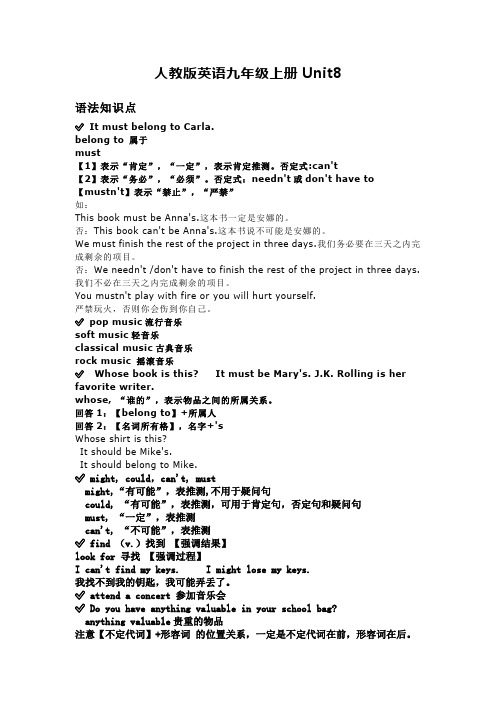
人教版英语九年级上册Unit8语法知识点✅It must belong to Carla.belong to 属于must【1】表示“肯定”,“一定”,表示肯定推测。
否定式:can't【2】表示“务必”,“必须”。
否定式:needn't或don't have to【mustn't】表示“禁止”,“严禁”如:This book must be Anna's.这本书一定是安娜的。
否:This book can't be Anna's.这本书说不可能是安娜的。
We must finish the rest of the project in three days.我们务必要在三天之内完成剩余的项目。
否:We needn't /don't have to finish the rest of the project in three days.我们不必在三天之内完成剩余的项目。
You mustn't play with fire or you will hurt yourself.严禁玩火,否则你会伤到你自己。
✅pop music流行音乐soft music轻音乐classical music古典音乐rock music 摇滚音乐✅Whose book is this? It must be Mary's. J.K. Rolling is her favorite writer.whose, “谁的”,表示物品之间的所属关系。
回答1:【belong to】+所属人回答2:【名词所有格】,名字+'sWhose shirt is this?It should be Mike's.It should belong to Mike.✅ might, could,can't, must⏺️might,“有可能”,表推测,不用于疑问句⏺️could, “有可能”,表推测,可用于肯定句,否定句和疑问句⏺️must, “一定”,表推测⏺️can't, “不可能”,表推测✅ find (v.)找到【强调结果】look for 寻找【强调过程】I can't find my keys. I might lose my keys.我找不到我的钥匙,我可能弄丢了。
新目标英语九年级unit 8单元知识点
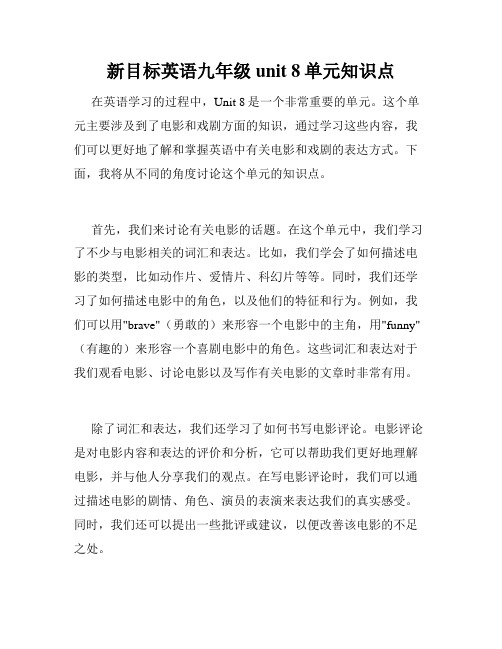
新目标英语九年级unit 8单元知识点在英语学习的过程中,Unit 8是一个非常重要的单元。
这个单元主要涉及到了电影和戏剧方面的知识,通过学习这些内容,我们可以更好地了解和掌握英语中有关电影和戏剧的表达方式。
下面,我将从不同的角度讨论这个单元的知识点。
首先,我们来讨论有关电影的话题。
在这个单元中,我们学习了不少与电影相关的词汇和表达。
比如,我们学会了如何描述电影的类型,比如动作片、爱情片、科幻片等等。
同时,我们还学习了如何描述电影中的角色,以及他们的特征和行为。
例如,我们可以用"brave"(勇敢的)来形容一个电影中的主角,用"funny"(有趣的)来形容一个喜剧电影中的角色。
这些词汇和表达对于我们观看电影、讨论电影以及写作有关电影的文章时非常有用。
除了词汇和表达,我们还学习了如何书写电影评论。
电影评论是对电影内容和表达的评价和分析,它可以帮助我们更好地理解电影,并与他人分享我们的观点。
在写电影评论时,我们可以通过描述电影的剧情、角色、演员的表演来表达我们的真实感受。
同时,我们还可以提出一些批评或建议,以便改善该电影的不足之处。
接下来,我们来探讨有关戏剧的知识。
戏剧是一种文化艺术形式,通过舞台表演来传达故事和情感。
在这个单元中,我们学习了戏剧和话剧的一些基本概念和特点。
我们了解到戏剧通常包括剧本、演员表演、舞台布景等要素,并通过台词和动作来传达情感和角色之间的关系。
此外,我们还学习了如何描述戏剧中的人物特征和情节,以及如何对戏剧作品进行评价。
在学习戏剧的过程中,我们还了解到了一些伟大的戏剧作家和他们的作品。
比如莎士比亚是世界上最伟大的戏剧家之一,他的《罗密欧与朱丽叶》、《哈姆雷特》等作品至今仍然受到人们的喜爱和赞赏。
通过学习这些经典的戏剧作品,我们可以更好地领略到戏剧的魅力和艺术价值。
正因为学习Unit 8的这些知识点,我们不仅能够提高自己的英语水平,更能够丰富自己的文化知识。
人教版九年级英语u8知识点总结
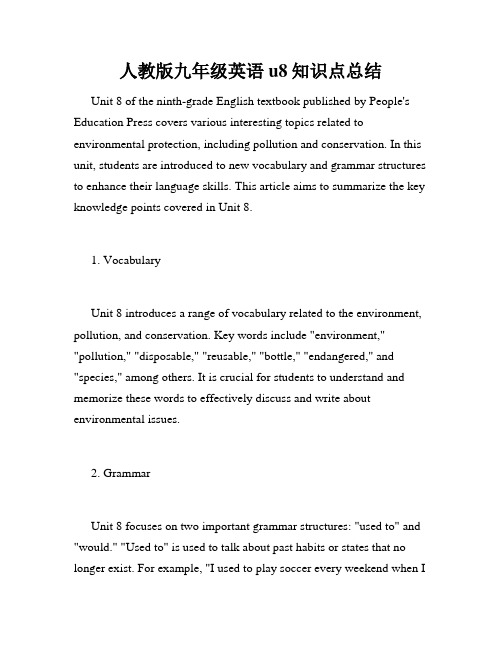
人教版九年级英语u8知识点总结Unit 8 of the ninth-grade English textbook published by People's Education Press covers various interesting topics related to environmental protection, including pollution and conservation. In this unit, students are introduced to new vocabulary and grammar structures to enhance their language skills. This article aims to summarize the key knowledge points covered in Unit 8.1. VocabularyUnit 8 introduces a range of vocabulary related to the environment, pollution, and conservation. Key words include "environment," "pollution," "disposable," "reusable," "bottle," "endangered," and "species," among others. It is crucial for students to understand and memorize these words to effectively discuss and write about environmental issues.2. GrammarUnit 8 focuses on two important grammar structures: "used to" and "would." "Used to" is used to talk about past habits or states that no longer exist. For example, "I used to play soccer every weekend when Iwas younger." On the other hand, "would" is used to describe past habitual actions or behavior. For instance, "I would often go fishing with my family during summer vacations."3. Reading ComprehensionOne crucial aspect of Unit 8 is reading comprehension. Students are exposed to various texts related to the environment, such as newspaper articles and interviews. It is essential for students to practice reading and comprehending these texts to improve their overall language proficiency and understanding of environmental issues.4. Writing SkillsIn Unit 8, students are encouraged to express their own opinions on environmental topics through writing. They learn how to write formal letters, persuasive essays, and reports. Writing tasks help students develop critical thinking skills and articulate their thoughts effectively. For example, students may be asked to write a persuasive essay on the importance of recycling or a report on the impact of air pollution on human health.5. Listening and SpeakingListening and speaking skills play a vital role in Unit 8 as students engage in various activities that promote oral communication. They listen to environmental speeches, discussions, and interviews to enhance their listening skills and expand their vocabulary. Speaking activities include group discussions, debates, and role-plays centered around environmental issues. These activities encourage students to express their thoughts, argue their opinions, and work collaboratively.6. Cultural AwarenessUnit 8 not only focuses on language skills but also aims to raise cultural awareness among students regarding environmental issues. Students learn about environmental problems faced by different countries and cultures, promoting empathy and understanding for global challenges. They explore solutions implemented by different countries and gain a deeper understanding of the international efforts towards environmental conservation.In conclusion, Unit 8 of the ninth-grade English textbook published by People's Education Press covers a wide range of knowledge points related to environmental protection. Through vocabulary acquisition,grammar practice, reading comprehension exercises, writing tasks, listening, speaking, and cultural awareness activities, students develop their language skills, critical thinking abilities, and understanding of global environmental challenges. It is important for students to dedicate time and effort to master the knowledge points covered in this unit to become effective communicators and environmentally conscious individuals.。
Unit8笔记人教版英语九年级全册
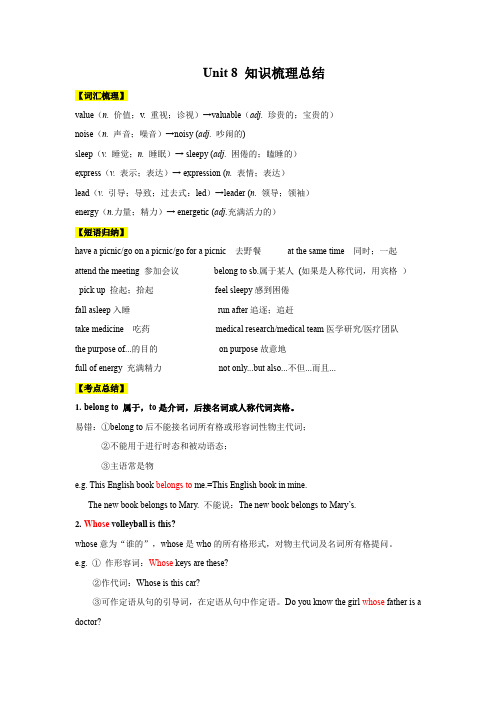
Unit 8 知识梳理总结【词汇梳理】value(n.价值;v. 重视;诊视)→valuable(adj.珍贵的;宝贵的)noise(n.声音;噪音)→noisy (adj. 吵闹的)sleep(v.睡觉;n.睡眠)→ sleepy (adj. 困倦的;瞌睡的)express(v.表示;表达)→ expression (n. 表情;表达)lead(v.引导;导致;过去式:led)→leader (n. 领导;领袖)energy(n.力量;精力)→ energetic (adj.充满活力的)【短语归纳】have a picnic/go on a picnic/go for a picnic 去野餐at the same time 同时;一起attend the meeting 参加会议belong to sb.属于某人(如果是人称代词,用宾格)pick up 捡起;拾起feel sleepy感到困倦fall asleep入睡run after追逐;追赶take medicine 吃药medical research/medical team医学研究/医疗团队the purpose of...的目的on purpose故意地full of energy 充满精力not only...but also...不但...而且...【考点总结】1.belong to 属于,to是介词,后接名词或人称代词宾格。
易错:①belong to后不能接名词所有格或形容词性物主代词;②不能用于进行时态和被动语态;③主语常是物e.g. This English book belongs to me.=This English book in mine.The new book belongs to Mary. 不能说:The new book belongs to Mary’s.2.Whose volleyball is this?whose意为“谁的”,whose是who的所有格形式,对物主代词及名词所有格提问。
人教版九年级英语unit8知识点总结
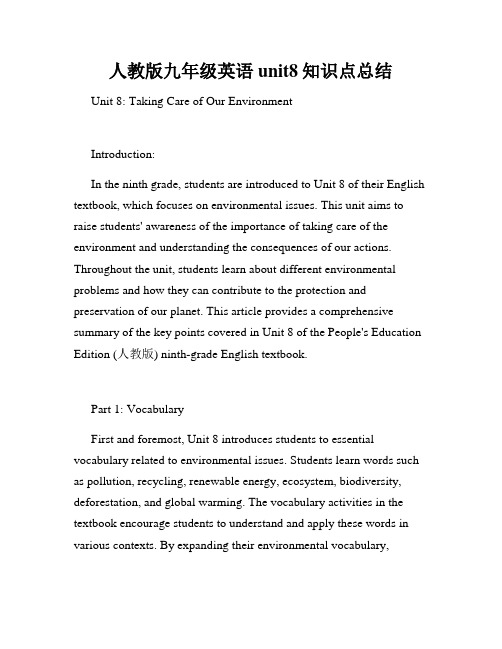
人教版九年级英语unit8知识点总结Unit 8: Taking Care of Our EnvironmentIntroduction:In the ninth grade, students are introduced to Unit 8 of their English textbook, which focuses on environmental issues. This unit aims to raise students' awareness of the importance of taking care of the environment and understanding the consequences of our actions. Throughout the unit, students learn about different environmental problems and how they can contribute to the protection and preservation of our planet. This article provides a comprehensive summary of the key points covered in Unit 8 of the People's Education Edition (人教版) ninth-grade English textbook.Part 1: VocabularyFirst and foremost, Unit 8 introduces students to essential vocabulary related to environmental issues. Students learn words such as pollution, recycling, renewable energy, ecosystem, biodiversity, deforestation, and global warming. The vocabulary activities in the textbook encourage students to understand and apply these words in various contexts. By expanding their environmental vocabulary,students can effectively communicate and express their thoughts on environmental topics.Part 2: Reading ComprehensionUnit 8 includes a series of reading passages that discuss various environmental issues. For instance, one passage explores pollution caused by plastic waste, highlighting its detrimental effects on marine life. Another reading passage talks about deforestation and its impact on the Earth's climate. These texts not only enhance students' reading skills but also provide them with valuable information about real-world environmental problems. Through comprehension questions and discussions, students develop their critical thinking and analytical skills.Part 3: GrammarUnit 8 also covers grammar points that are relevant to environmental topics. For instance, students learn how to use modal verbs, such as should, must, and have to, to express obligations and recommendations related to the environment. Grammar exercises in the textbook reinforce the understanding and application of these concepts. By mastering grammar structures, students can effectively express their concerns and propose solutions to environmental issues.Part 4: WritingTo deepen their understanding and engagement with environmental issues, students are given opportunities to develop their writing skills. Unit 8 includes writing tasks that require students to write formal letters, opinion articles, and poster slogans. These writing activities encourage students to think critically about environmental problems and express their own ideas. By honing their writing skills, students can become effective advocates for environmental protection.Part 5: Projects and ActivitiesUnit 8 promotes active learning through projects and activities. Students are encouraged to work in groups and participate in discussions or debates on environmental topics. They can organize campaigns to raise awareness in their school or community about pressing environmental issues. These group activities not only enhance students' collaboration and communication skills but also instill a sense of responsibility towards the environment.Part 6: Listening and SpeakingThe listening and speaking activities in Unit 8 aim to improve students' communication skills in English while discussing environmental topics. Students listen to dialogues and interviews related to environmental conservation, ensuring exposure to different perspectives. By engaging in role-plays and discussions, students canexpress their opinions, practice their speaking skills, and learn to respect diverse viewpoints.Conclusion:Unit 8 of the People's Education Edition ninth-grade English textbook provides a comprehensive overview of environmental issues. Through vocabulary, reading comprehension, grammar exercises, writing tasks, projects, and activities, students gain a deeper understanding of environmental problems and are encouraged to actively contribute to the well-being of our planet. By completing this unit, students will not only enhance their English language skills but also cultivate a sense of responsibility towards the environment.。
初中英语人教新目标九年级全册Unit 8—Unit 14语法知识点总结

九年级英语全册单元语法知识点Unit 8:It must belong to Carla.第八单元的语法重点是:情态动词表推测。
情态动词表推测情态动词 must,may,might,could,may,can 表示推测含义与用法后面都接动词原形,都可以表示对现在情况的揣测和推断但他们含义有所不同。
① must 一定,肯定(100%可能性)② may,might,could 有可能,也许(20%、80%可能性)③ can't 不可能,不会(可能性几乎为零)如:The dictionary must be mine.It has my name on it.The hair band can't be Bob's.After all,he is boy!【直击中考】1.【吉林长春】20.-Are the glasses Tim's?-No,they _______ be his.He doesn't wear glasses.A.mustB.canC.mustn'tD.can't2.【江苏宿迁】5.-Excuse me,is this the way to No.10 Middle School?-Oh,sory.I'm not sure.But it ______ be.A.mustB.shouldC.needD.mayUnit 9:I like music that I can dance to.第九单元的语法重点是:定语从句。
定语从句★定语从句:在复合句中,修饰某一名词或代词的从句叫做定语从句。
定语从句可以分为限制性定语从句和非限制性定语从句。
本单元主要学习由 who、that、which 引导的限制性定语从句。
★先行词:被定语从句所修饰的名词或代词称为先行词。
★关系代词:引导定语从句的关联词称为关系代词。
关系代词在定语从句中有三个作用:(1)引导定语从句;(2)代替先行词;(3)在定语从句中充当一个成分。
初中英语人教新目标九年级全一册unit8知识点

九年级英语全一册Unit8知识点【重点单词】1.valuable adj.有价值的value n.价值2.receive v.收到receipt n.收据;收条;收入【重点短语】1.belong to属于2. toy ruck 玩具卡车3.at the picnic在野餐中4. attend a concert参加音乐会5.the rest of剩下的;其余的6.pick up 捡起7.nothing much没什么事8.at first 起初9.in the neighbourhood在社区里10.run away 抛开11.have no idea不知道12.catch a bus 赶公共汽车13.make a noise制造噪音14.go away 离开15.feel sleepy感到困倦16.run after 追赶17.not only...but also...不仅……而且……18.historical places 历史遗迹municate with sb.和某人交流20.a kind of 一种21.have a medical purpose有一种医学目的22.prevent illness预防疾病23.keep/stay healthy 保持健康24.point at/out/to指着/出/向25.in a certain way 以某种方式26.a victory over an enemy战胜敌人27.noise-maker 噪音的制造者28.have fun doing sth做某事开心29.feel uneasy 感到不安30.create fear制造恐惧【重点句型】1.If you have any idea where might be please call me.如果你知道它可能在哪,请打电话给我。
2.It’s crucial that I study for it because it counts 30% to the final exam. 关键是我必须学,因为它占期末考试的30%。
- 1、下载文档前请自行甄别文档内容的完整性,平台不提供额外的编辑、内容补充、找答案等附加服务。
- 2、"仅部分预览"的文档,不可在线预览部分如存在完整性等问题,可反馈申请退款(可完整预览的文档不适用该条件!)。
- 3、如文档侵犯您的权益,请联系客服反馈,我们会尽快为您处理(人工客服工作时间:9:00-18:30)。
Unit 8 It must belong to Caral短语归纳1. belong to… 属于…2. hair band 发带3. go to/attend a concert 参加音乐会4. in the music hall 在音乐大厅5. something valuable/unusual 贵重/不寻常的东西6. something strange 奇怪的事情7. at the picnic 在野餐时8. the rest of.... 其余的……9. pick it up 捡起,拾起10. each other=one another 互相,彼此11. nothing much 没什么(事)12. go to a picnic=go for a picnic 去野餐13. anything else 其它的东西14. be interviewed by... 被…采访15. strange noises 奇怪的16. outside our window 在我们的窗外17. next-door neighbor 隔壁邻居18. at first 首先,起初19. run away 逃走20. feel uneasy 感到不安21. have no idea=don't know 不知道22. a long period of time 很长一段时间23. have fun doing sth. 做某事开心24. create fear制造恐惧25. There must be …doing sth. 一定有…在做某事26. cough a lot 咳得厉害27. run after 追赶28. run to do sth. 跑着去做某事29. must be dreaming 一定在做梦30. run for exercise 跑步锻炼31. make a movie 拍电影32. wear a suit 穿西服/套装33. express a difference / result 表达差异/ 结果34. add information 添加信息35. at the same time 同时36. a rock circle 一个石头圈37. most famous historical places 最著名的历史名胜38. a group of… 一群…39. a bit late 有点晚儿40. communicate with ...与……交流41. so many centuries ago许多世纪前42. point out 指出43. put together 放在一起44. in a certain way 以某种方式45. on midsummer's morning 在仲夏的上午46.shine directly into… 直接照进…47. the center of ... ……的中心48. move up 上升,提升49. the position of... …的位置50. burial place 墓地51. a place to honor ancestors祭拜祖先的地方52. celebrate a victory over an enemy庆祝战胜敌人用法集萃1. belong to 属于(=be)It must belong to Carla. = It must be Carla's.※练一练① The notebook must be my friend's.(同义句)The notebook must __________ _______ my friend.② The book must be Jim's.(否定句)The book _________ ________ Jim's.③ The book on the chair must belong to ________. Her name is on the cover.A. herB. hersC. sheD. him2. attend a concert参加音乐会(go to concert 去听音乐会)【比较应用】attend主要指以观众或听众的身份参加婚礼,丧礼,会议或讲座或上课。
join in参加某项活动,尤指参加正在进行的活动。
join 参加某个组织、党团、俱乐部等机构,成为其中一员。
take part in参加某些活动或工作,在其中起了作用。
(可和join in 互换)※练一练Mr. John invited many friends to _______ his wedding. A. take part in B. join C. join in D attend 3. anything valuable贵重的东西当形容词修饰something, anything, nothing, everything等复合不定代词时,后置。
something unusual anything strange nothing important※练一练In this book, you can learn________.A. something educationalB. educational somethingC. anything educationalD. educational anything4. the rest of my friends 我剩下的朋友the rest of... (剩余的……)作主语,谓语动词的单复数由of 后边的名词决定。
※练一练①The rest of the books_____dull.②The rest of oil _____not enough.5. ...must have picked it up. ……一定是捡起它了。
⑴must have done sth(过去一定做某事了)表示对过去的事情的推测⑵pick up捡起(代词放中间)※练一练When he saw a wallet on the ground, he _______ at once.A. picked it upB. gave it upC. picked up itD. worked it out6. happen与take place 发生(无被动式)⑴ happen 特别指那些偶然或未能预见的事件发生。
Sth. happened to sb.某人发生了某事Sb. happened to do sth.某人碰巧做某事⑵ take place 指某事按计划进行或按计划发生。
★take place有“举行”之意,而happen有“碰巧”的意思。
※练一练①A strange thing happened _____ her last night, so she is afraid to stay at home alone tonight.A. atB. forC. withD. to②Great changes _________________(发生)in China since the last thirty years.③The meeting _________________(举行)next Friday.④ _________________(碰巧)that I had no money on me.7. There must be something visiting the homes. 一定有什么东西光顾这些住户。
⑴There be+主语+doing sth.有某人(物)正在做某事(表存在)There are some people surfing on the sea, aren't there? 有些人正在海上冲浪,对吗?There is a cat eating fish in the corner. 墙角有一只猫正在吃鱼。
⑵There must be +主语+doing 一定有某人(物)正在做……(对某种存在的推测)There must be someone playing the violin there. 准有人在那里拉小提琴。
※练一练①There _____________________________________________ in the forest. 一定有人在森林里砍树。
②There _______________________________ in the tree. 树上有只鸟儿在唱着歌。
8. feel sleepy 感动困乏sleepy adj. 困乏的,昏昏欲睡的sleepy expression(懒洋洋的表情)asleep adj. 睡着的(表语形容词)fall/be asleep①In spring, people often feel_________(sleep)②I didn't have a good_____ last night, so I was ______ and I fell _____ in class.A. sleep; asleep; sleepB. asleep; sleep; sleepyC. sleep; sleepy; asleepD. sleepy; sleep; asleep9. ...not only one of Britain's most famous historical places but also one of its greatest mysteries.⑴not only... but also...不但……而且……⑵either... or... 或者……或者……;要么……要么……;不是……就是……(两者选择其一)⑶neither... nor...既不……也不……(两者都不)⑷both... and... ……和……(两者)都这四组连词都可以用来连接两个性质相同的并列成分,作主语、谓语、宾语或表语等,但⑴⑵⑶在连接句子主语时,谓语动词采取“就近原则”。
both... and... 连接两个主语时,谓语动词通常用使用复数形式。
Neither he or she works here. 他和她都不在这里工作。
(主语)You can either come with me or walk home. 你要么跟我一块去,要么走回家去。
(谓语)I have neither time nor money. 我既没时间也没钱。
